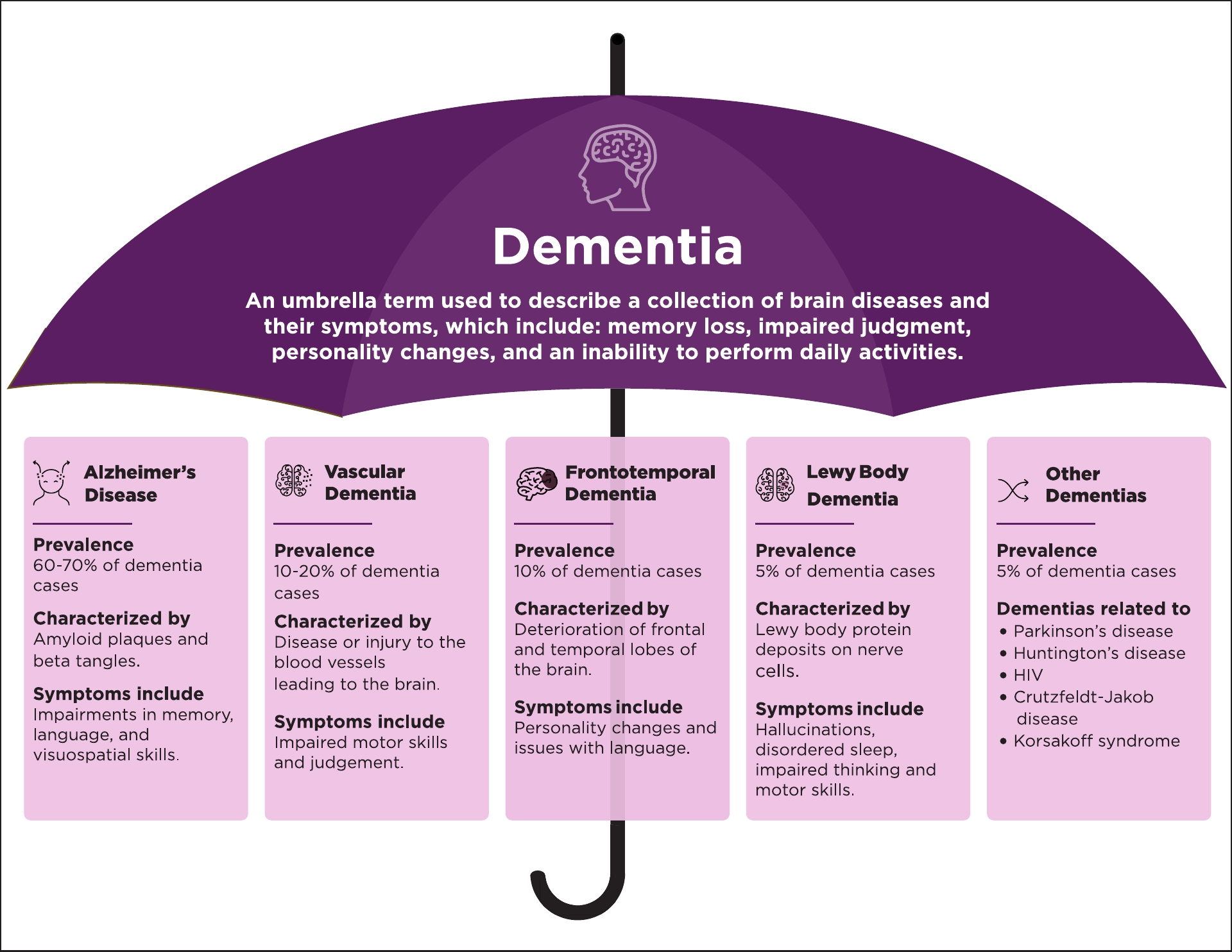Dementia is an umbrella term used to identify a variety of brain diseases and cognitive defects that have varying symptoms. However, these diseases all have symptoms such as personality changes, impaired judgment, and memory loss in common. To diagnose these conditions accurately, doctors must complete a series of tests. The progression of the illness depends on the stage in which the person received their diagnosis and the severity of their symptoms.
What Is Alzheimer’s Disease?
Alzheimer’s disease is the most commonly diagnosed form of dementia, and the disease is known to affect memory, cognitive abilities, and prevent individuals from completing activities of daily life on their own. Studies show that about 60% of dementia cases are Alzheimer’s disease. According to statistics, most individuals who are diagnosed with Alzheimer’s disease have plaque in their brain that causes impairments. When reviewing community options, individuals with Alzheimer’s disease or their family members may want to consider assisted living or memory care in Tomball, TX.
Reviewing Vascular Dementia
In an assisted living community, residents in need can get assistance with memory dysfunction caused by vascular dementia. The form of dementia causes memory loss, behavior changes, and alternative ways of thinking and comprehension because of damage to the blood vessels in the brain. The effects of the disease are defined by the number of changes in the blood vessels and the progression of the disease. Studies show that 10 to 20% of dementia diagnoses are vascular.
Frontotemporal Dementia and Its Effects
Frontotemporal dementia is classified as a disorder that affects the nerve cells in the temporal and frontal lobes of the brain. The condition alters the personality, causes behavior changes, affects the language, and hinders movement. An average of 10% of all dementia diagnoses meet the criteria for this condition.
Lewy Body Dementia
Lewy body dementia is diagnosed by an MRI that shows protein deposits on the brain or alpha-synuclein. The form of dementia causes movement impairment, behavioral and mood changes, and introduces difficulties when concentrating or thinking. Statistics show that 5% of all dementia diagnoses are this form of disease.
Additional Conditions That Lead to Dementia
Medical statistics show that a variety of diseases that aren’t classified as dementia could lead to dementia and other cognitive defects. These diseases include Parkinson’s disease, Huntington’s disease, HIV, Creutzfeldt-Jakob Disease, and Korsakoff syndrome. Many of these conditions require memory care, physical therapies, and medications to control symptoms and prevent the deterioration of the brain.
How Does Memory Care Services Help?
Local communities offer memory care services that are designed to improve cognitive function and help the residents retain more memories. The services include activities that promote recollection and offer techniques to improve concentration and make it easier for the residents to complete activities of daily life on their own. Caregivers may provide games, activities, and opportunities to socialize that help individuals improve the way the brain and memory work.
A Great Place for Seniors With Dementia
Harvest Home and Inwood Crossing offer exceptional apartments for seniors, and the community is a terrific place for anyone who is experiencing dementia symptoms. The community provides several services to keep residents independent and enjoying their lives. Seniors or families who want to learn more about an experienced memory care center in Tomball, TX can get started by setting up a tour of the community now.
Assisted living communities provide exceptional homes for seniors with dementia. The communities offer wonderful options for socializing and developing friendships with others who face the same challenges.
After a diagnosis of any form of dementia, the seniors need assistance with retaining their memories and improving cognitive function. Memory care services are a wonderful option for anyone who has received these diagnoses, and the services give residents a chance to live independently for as long as possible.
By living in an assisted living community, the residents can enjoy life and plan their own lives. The communities plan regular activities that are helpful and make residents cognitively stronger. Families and seniors can learn more about these communities by visiting today!






